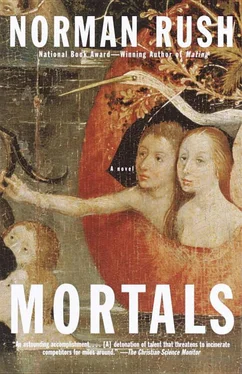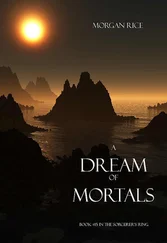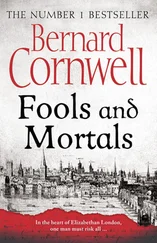Something was going on at the door.
Morel was striding arduously forward, friendly and resolute, which was wrong. There was a routine to follow.
“Davis, we have to stay over there against the wall,” he said.
There would be trouble. They were supposed to have their backs to the door, their hands over their heads. There would be trouble and it would be his fault. He knew the routine and they would assume he had communicated about it.
“Dumelang,” Morel said, booming it out, full of morning cheer, as the doors were pulled open.
Ray didn’t understand.
Two men in black balaclavas had delivered breakfast, a genuine breakfast, of sorts, not just a dish of samp or mealie-meal. No, they had provided a leathery brown omelette, an ostrich egg omelette, served on a square of kraft paper, cold. And with it had come two kinds of crackers, eight of them, four of each kind. The omelette had been huge, and there had been eight figs, pretty dried up but still edible, which Morel had insisted Ray eat all of. And there had been a plastic liter bottle of cold tea and another one of plain water. And Morel had done a song and dance and the guards had agreed to leave the water in the cell.
And then Morel had made as if to hand the waste bucket to them, to the guards, to take care of, and they had bridled, but they had allowed him to carry it out and empty it himself, a little away from the shed. And he had brought it back tolerably cleaned up. He had shaken sand around in it.
And there had been no repercussions over not following the standing-against-the-wall-with-back-turned protocol.
Ray didn’t understand. It was showing.
“I know what this is,” he said.
“What what is?”
“This … all this. This food.”
Morel was secreting the paper the omelette had come on, folded up, in a crack in the wall.
“No, they’re softening us up. This is the softening-up phase. They’ll alternate. You’ll see.”
“Maybe they’re through with us, Ray.”
“That’s what they want us to think. Don’t. Don’t relax.”
“You’re the coach,” Morel said.
There was a knock at the door, a knock, not a barrage of banging and pounding. And the door was unchained again.
The guards were back. This time an old woman was with them. She was carrying a large basin of hot water. Steam was rising from the water. Ray wanted to sink his face into the water however hot it was. A sponge was produced, a couple of not too unclean-looking rags, and a bar of yellow soap, laundry soap but still soap.
Morel’s Setswana was very good, surprisingly good. That had to be part of the explanation for the improvement in their situation. He could only follow what Morel was saying after the fact, by repeating to himself whichever line or fragment he could catch and remember. Lere ditlhako tsa me meant Bring me my shoes. It was in the imperative mode. Morel thought he was going to get his shoes returned. It was laughable. Morel spoke Setswana rapidly, too rapidly, like a native speaker. If he would slow down I could understand more, Ray thought.
For some reason, their captors were being less paranoid about allowing them to see something of the grounds, the surroundings. They still had to do their little tasks, like eating, inside, with the doors closed. But Morel had been allowed a few moments in the open. And incidental glimpses of the main building were not being forbidden.
Closed in again, Morel and Ray crouched down at the basin. There is no civilization without hot water, Ray thought. Washing up would be voluptuous. He wanted to at least touch the water while it was still hot. The question was whether or not he should go first, whether he should assume it would be fair for him to go first, because he was the filthier. Or would it make more sense for Morel to go first because he was cleaner and so would need less water? Inevitably meanwhile the water was cooling. He couldn’t stand it.
“You go ahead,” Ray said.
But Morel had his own protocol and that was the one that would be followed. Apparently, according to it, Ray would be allowed right off the bat to lavishly wash his face, his orbits, his eye-pits if that was the name for them. He was encouraged to do that. He did it.
And then began the painstaking, assisted part of the procedure, the scalp-cleaning, followed by all the secondary ablutions, the laving of his armpits and so on. It was all done expertly, stretching the water, as Morel put it, carefully lathering up a particular area before rinsing with the sponge. The wastewater fell to the floor.
Ray felt like a baby, once it was done, but he felt much better.
Morel used the remaining water on his own face and feet. He had dedicated the precious water almost entirely to Ray.
“Thank you,” Ray said. It was awkward.
He felt restored. He was less his body and more himself, less his body pulsing and hurting and preoccupying everything, more his consciousness of Iris, he was sorry to say. But it was true. He was sorry because now it was time to take up the question of Iris, with Morel. He knew he should put it off but he couldn’t put it off.
He was ready to go. He was gathering his breath to begin when there was an interruption, noise outside. And then the doors were unlocked and cracked open and Morel was summoned out, and then, and this was new, the doors were pushed shut but not locked.
He didn’t know what to conclude. Something was new.
An evident altercation was taking place just outside and then Morel was back, pushed into the cell. Ray had gathered pretty well what the altercation had been about. It had transpired in English and Setswana and it had been about Morel’s shoes. He had been demanding the return of his shoes as a precondition for whatever it was they wanted. And Ray was getting clearer about what that might be, what the explanation for the better treatment they were enjoying might be, that is.
There was something undeniably what, tough, about Morel, something tough or reckless and more reckless than tough. It was one thing to be tough if you fully appreciated what these evil cocksuckers were capable of doing to you and another thing if you didn’t. These bastards came trailing clouds of murder and arson and beatings. Morel knew it, but he knew it in the way you know something you read about in the paper. That is, he knew it but didn’t know it.
But Ray knew the truth, which raised the question of why he wasn’t himself considering the question of throwing himself on one of the bastards and breaking his neck with a move he knew how to do. In the grand scheme of things that would be a worthy thing to do, removing one of these bastards from the phalanx they were in, making one fewer of them in the world, even if it got him killed and removed from life, which it would.
He really ought to think about it. Koevoet was an evil plague. It would be doing something. There was the question of his life, of course, and whether he could do something more useful than that with it. He would have to take the idea under advisement, killing one of them. He would have to take the idea under advisement. He had numerous ideas under advisement. This would be one more.
But it was all academic because of Iris, because he had to conclude with her and it had to be face to face. It had to be done in the flesh. It had to be open. It had to be a clear thing. He had to let her argue her side, argue, say, that they should stay together despite everything, not go, not go.
And she needed to hear what he had to say, not that there was that much on his side. And he needed to hear the dire truth or whatever lies she might want to try on him, showing how abject she could be, how much she wanted to take everything back. And he needed to see what that would do to him, if that was the way things went. So he had to live.
Читать дальше












